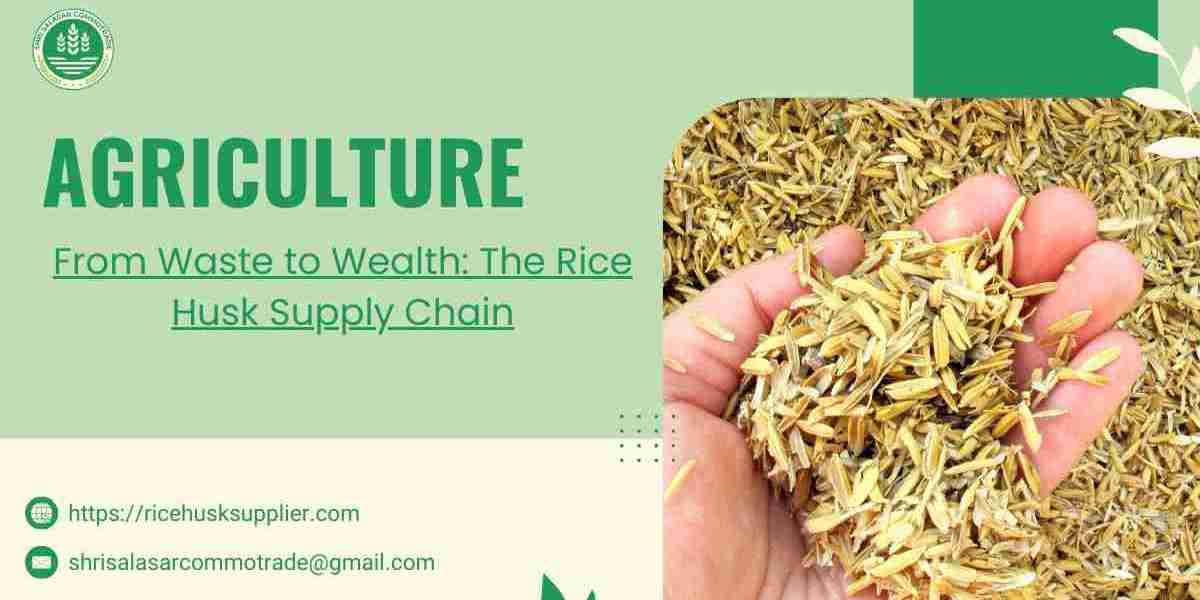Introduction
Agricultural waste has long been seen as a burden for both farmers and industries. But with rising awareness around sustainability and the push for a circular economy, things are changing fast. One such underutilized resource making waves is rice husk—the fibrous outer shell removed during rice milling. Once considered just waste, rice husk is now a valuable raw material across multiple industries, from energy and construction to packaging and agriculture. This transformation wouldn’t be possible without the role of a reliable Rice Husk Supplier who acts as a crucial link between rice mills and industries seeking eco-friendly alternatives. In this blog, we’ll explore how rice husk moves through the supply chain and how the right supplier can help industries turn agricultural waste into opportunity.
What Is Rice Husk and Why Is It Important?
Rice husk is the hard protective covering that surrounds rice grains. When rice is milled, about 20–25% of the grain's total weight becomes husk. Given India’s position as one of the largest rice producers in the world, millions of tons of rice husk are generated every year. While once considered agricultural waste, rice husk is now recognized for its high silica content, insulating properties, and renewable nature. Industries ranging from construction to energy, steel, ceramics, and even beauty and wellness are now sourcing rice husk for its versatile applications.
The Rice Husk Supply Chain: From Field to Factory
Transforming rice husk from waste to resource involves several steps. Here’s how the supply chain works:
1. Harvest and Milling
It all begins in the rice fields. Once harvested, paddy rice is transported to mills. During milling, the husk is separated from the edible grain. Traditionally, this husk was burned or dumped, leading to pollution and waste.
2. Collection and Storage
Today, many modern rice mills partner with rice husk suppliers who collect and store the husk in bulk. Proper storage is key to maintaining the material’s dryness and purity, especially for industrial applications.
3. Processing and Sorting
Depending on its end use, rice husk may undergo additional processing such as grinding, pelletizing, or carbonizing. These methods prepare the husk for use in specific industries—whether it's biofuel pellets for energy, fine powder for silica extraction, or carbonized husk for filtration.
4. Distribution and Supply
Reliable rice husk suppliers ensure timely delivery to industries. The supply chain has evolved to include logistics partners and digital platforms that help match supply with demand more efficiently, especially for exports.
Who Uses Rice Husk—and How?
Rice husk’s wide-ranging properties make it valuable across sectors:
Power Generation: Used as biomass fuel in boilers and power plants.
Construction: Mixed into concrete and cement for added strength and insulation.
Agriculture: Used as animal bedding or composting material.
Steel & Foundry: Acts as an insulating agent in metal casting.
Silica Extraction: Processed to extract high-quality silica for paints, rubber, and electronics.
Cosmetics & Personal Care: Finely milled husk is used in scrubs and masks for its natural exfoliating qualities.
Why Choosing a Reliable Rice Husk Supplier Matters
While rice husk is abundant, not all suppliers offer the same quality, consistency, or delivery standards. A reliable rice husk supplier ensures:
Clean and moisture-controlled material
On-time bulk deliveries
Compliance with environmental and quality norms
Custom processing options (pellets, ash, powder, etc.)
Support for exports and logistics
Whether you’re a domestic manufacturer or an international buyer, partnering with the right supplier ensures smooth production and product quality.
The Sustainability Angle
One of the biggest reasons for rice husk’s growing demand is its eco-friendly appeal. Using rice husk reduces dependency on non-renewable resources and minimizes agricultural waste. For industries aiming to go green, this material offers a compelling way to cut carbon emissions, reduce waste disposal costs, and support circular economy practices.
Future of the Rice Husk Industry
With the rise of green technology, government incentives for biomass energy, and increasing environmental regulations, the rice husk market is poised for growth. Innovations such as rice husk-based bioplastics and biodegradable packaging are already emerging. Startups and enterprises are exploring new value-added products, while exporters are tapping into global markets.
Conclusion
Rice husk is no longer just waste—it’s an opportunity. From powering factories to enhancing soil health and producing green energy, it’s playing a crucial role in sustainable industrial practices. The transformation of rice husk from a discarded byproduct to a valuable commodity is a story of innovation, collaboration, and conscious entrepreneurship. If you’re a business looking to embrace sustainability, it may be time to explore what a reliable rice husk supplier can offer. After all, the next big step in your green journey might just begin with a humble husk.














